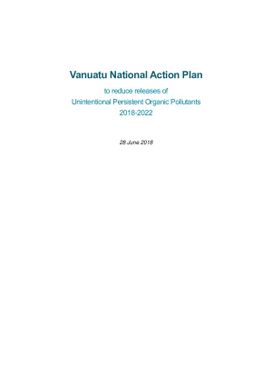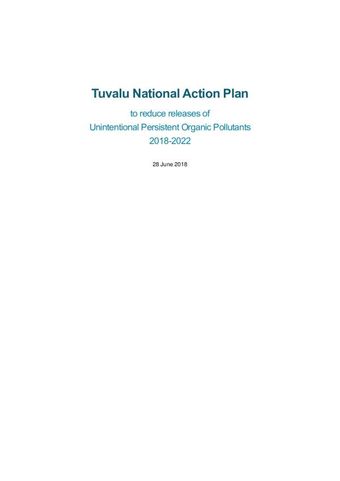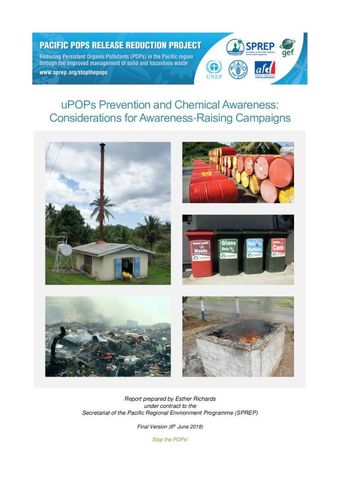Vanuatu National Action Plan to reduce releases of Unintentional Persistent Organic Pollutants 2018-2022.
- Description:
- Persistent Organic Pollutants (POPs) are toxic chemicals that can travel long distances through air and water and accumulate in the fatty tissues of humans and other animals. These POPs do not degrade quickly over time, and consequently, potentially expose people to serious health issues including cancer, birth defects and immune system impairments. As a result of anthropogenic releases of POPs to the environment since the 1940s, POPs are now widely distributed over large regions, including the Pacific Islands. To address the global environmental threat of POPs, the Stockholm Convention on POPs was adopted in May 2001 and entered into force on 17th May 2004. The Stockholm Convention commits Parties to reducing, and where feasible, eliminating the production and environmental releases of POPs. Vanuatu became a Party to the Convention on 15th December 2005. For more information on the Stockholm Convention, please visit http://chm.pops.int/.
- Display date:
- 2018
- Location:
- Vanuatu
- Collections:
- Secretariat of the Pacific Regional Environment Programme (SPREP)
- Content partner:
- Secretariat of the Pacific Regional Environment Programme (SPREP)
- Availability:
- Not specified
-
Copyright status: All rights reservedFind out more about what you are able to do with this itemThis item is all rights reserved, with means you'll have to get permission from Secretariat of the Pacific Regional Environment Programme (SPREP) before using it. For more information, please see our use and reuse page.What can I do with this item?Non-infringing useNZ copyright law does not prevent every use of a copyright work, and this item may be hosted by an international institute or organisation. You should consider what you can and cannot do with a copyright work.No sharingYou may not copy and/or share this item with others without further permission. This includes posting it on your blog, using it in a presentation, or any other public use.No modifyingYou are not allowed to adapt or remix this item into any other works.No commercial useYou may not use this item commercially.
Related items
Welcome and warm Pasifik greetings
The information on this site has been gathered from our content partners.
The names, terms, and labels that we present on the site may contain images or voices of deceased persons and may also reflect the bias, norms, and perspective of the period of time in which they were created. We accept that these may not be appropriate today.
If you have any concerns or questions about an item, please contact us.


